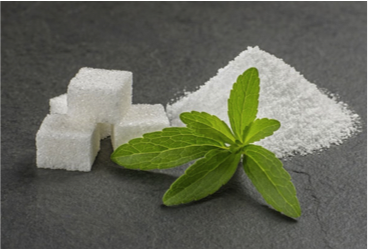Lines of cocaine or a sugary treat, are you addicted?
Part Three – A life without sugar
I’d finally finished with my “sugar detox” I had survived a month without refined sugar. Where to go from here? Should I just keep going without sugar, could I replace it with those “natural” sugar substitutes? Or could I go back to eating sugar just in more moderation? Or say stuff it and go to Krispy Kreme’s and get myself a dozen original glazed doughnuts and eat them with no shame. I decided to investigate the sugar substitutes instead. As much as Krispy Kreme appealed to my inner devil, it was not worth the “comedown”.
The main natural substitute that is used to replace sugar is sourced from the plant Stevia. This plant is native to New Mexico, Arizona and Texas and is part of the Asteraceae family.
According to Kris Gunnar, a writer for Authority Nutrition “The two major sweet compounds that are isolated from the leaves are called Stevioside and Rebaudioside A. These two compounds are hundreds of times sweeter than sugar.”

Stevia’s glycosides do not raise blood sugar levels, so stevia-sweetened drinks and desserts are suitable for anyone with diabetes. The human body does not metabolise the sweet glycosides and they pass through and are eliminated, so the body does not extract any kilojoules/calories. I decided that Stevia might’ve been the way.
So that was it… my month without sugar was finally finished. I think it’s time for a little reflection on what my month was like. I was so shocked that something I consumed everyday for almost my entire life was so detrimental to my health. The way I consumed sugar could almost be classified as a form of substance abuse. So I want to put a challenge out there for you guys. I want you all to try a month without sugar. Just to see how hard it really is. I guarantee you’ll be horrified at how your body reacts… I know I was.
Further reading:
Nieh.E, Matthews.G, Allsop.S, Presbrey.K, Leppla.C, Wichmann.R, Neve.R, Wildes.C, Tye.K, 2014, “Decoding Neural Circuits that Control Compulsive Sucrose Seeking” Cell Vol.160. Issue 3, p528-541
Authority Nutrition, 2016, “What is Stevia” Retrieved May 4. <https://authoritynutrition.com/stevia/ >
Food Watch, 2014 “Stevia, a sweetener hits the shelves” Retrieved May 4.
<http://foodwatch.com.au/blog/in-the-news/item/stevia-a-new-sweetener-hits-the-shelves.html>

What a great idea! I love the fact that you have used yourself as the experiment, however it would have been nice to have some more information about other evidence in this blog from other similar experiments to contrast between your experience and others. And also maybe see your thoughts or information about the other sweeteners such as ‘Equal’, ‘nativa’, splenda or other similar products. Also what are your views on the “The truth about sugar” documentary. They stated within that documentary that artificial sweeteners had the same effect of not worse on the human body. Also what further evidence might there be to sugar being an addictive substance. Oh believe me I think it is for sure, who can deny it really? But is there research on this area? This might have been a cool insight to see.
LikeLike